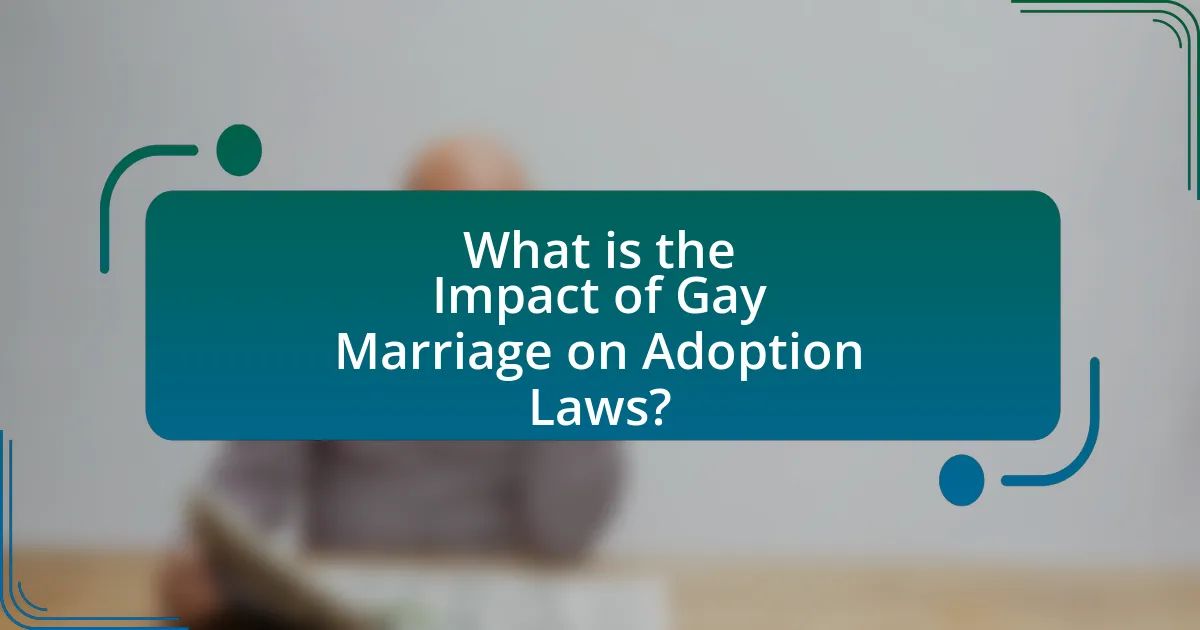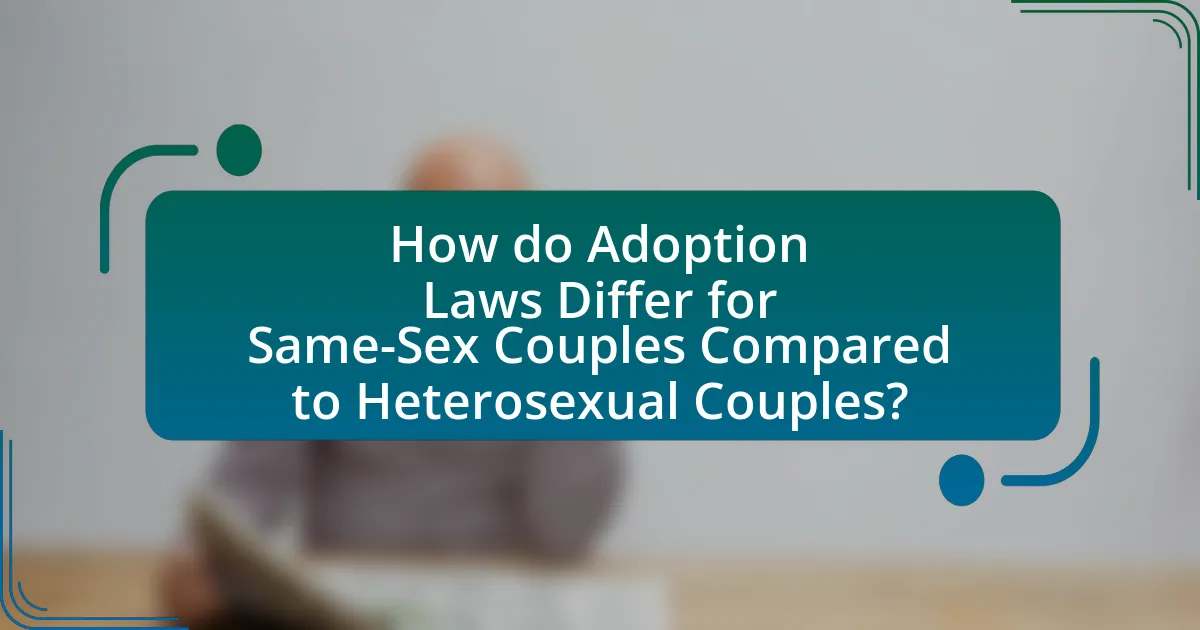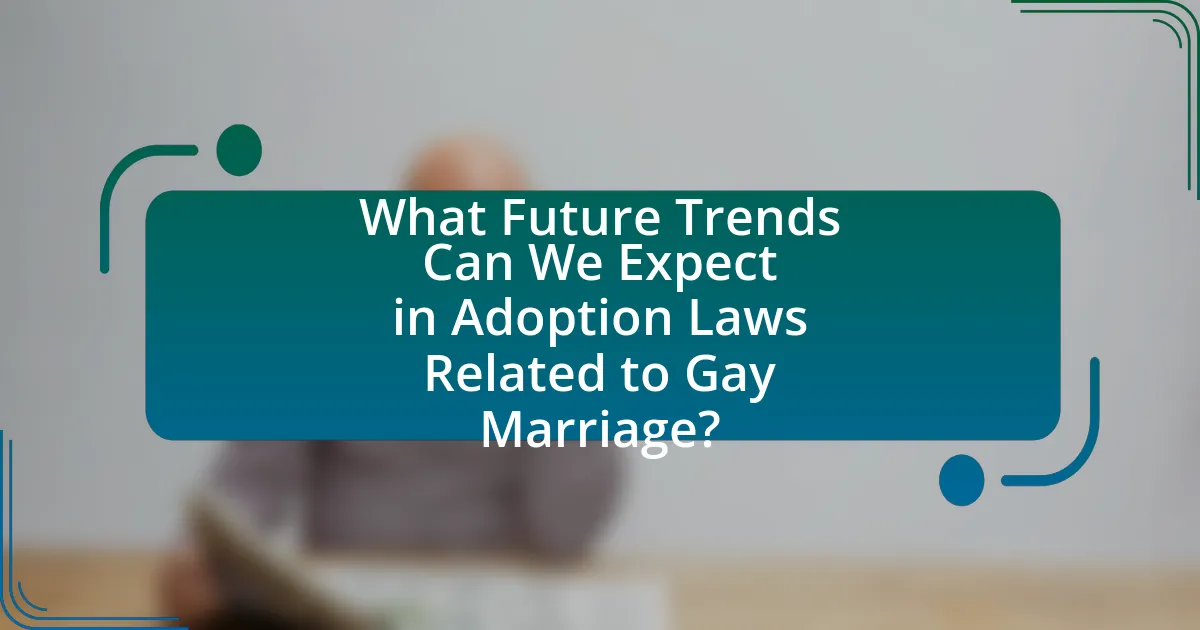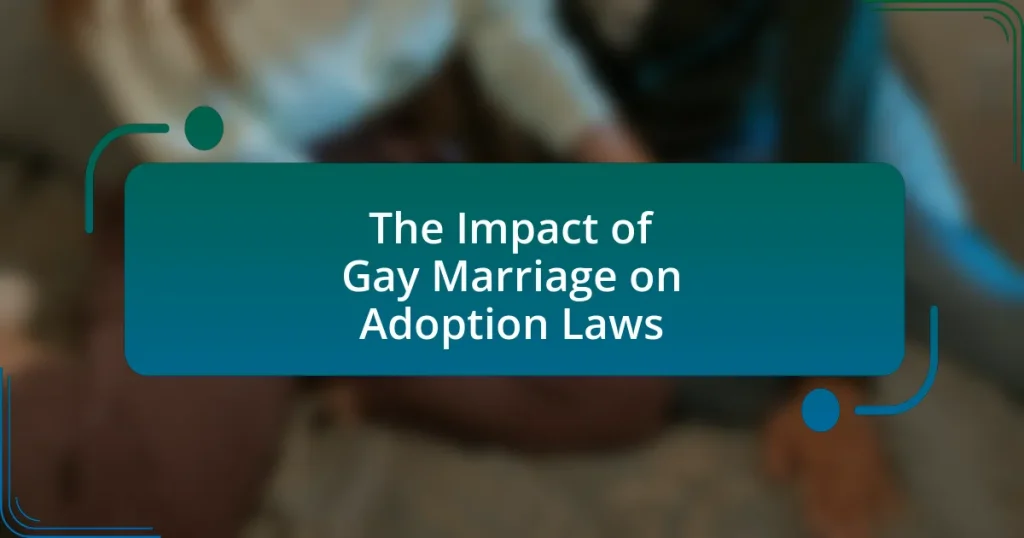The article examines the significant impact of gay marriage on adoption laws, highlighting the increased legal recognition and rights for same-sex couples in various jurisdictions. Following the landmark 2015 U.S. Supreme Court decision in Obergefell v. Hodges, many states have amended their adoption laws to eliminate discrimination, allowing same-sex couples to adopt children on equal terms with heterosexual couples. The article discusses the societal implications of these changes, the role of advocacy groups, the challenges faced by same-sex couples in the adoption process, and the ongoing legal hurdles that remain despite advancements in marriage equality. Additionally, it explores future trends in adoption laws and the resources available to assist same-sex couples navigating the adoption landscape.

What is the Impact of Gay Marriage on Adoption Laws?
The impact of gay marriage on adoption laws has been significant, leading to increased legal recognition and rights for same-sex couples in many jurisdictions. Following the legalization of gay marriage, numerous states and countries have amended their adoption laws to allow same-sex couples to adopt children on equal terms with heterosexual couples. For instance, the U.S. Supreme Court’s 2015 decision in Obergefell v. Hodges, which legalized same-sex marriage nationwide, has been linked to changes in adoption policies, enabling same-sex couples to adopt in states that previously restricted their rights. Research indicates that children raised by same-sex couples fare just as well as those raised by heterosexual couples, reinforcing the argument for equal adoption rights.
How has the legalization of gay marriage influenced adoption rights?
The legalization of gay marriage has significantly influenced adoption rights by enabling same-sex couples to adopt children more easily and equitably. Following the legalization, many jurisdictions revised their adoption laws to eliminate discriminatory practices that previously hindered same-sex couples from adopting. For instance, a study by the Williams Institute found that states that legalized gay marriage saw an increase in adoption rates among same-sex couples, reflecting a broader acceptance and legal recognition of their family structures. This shift has led to greater legal protections and rights for same-sex couples in the adoption process, aligning their rights with those of heterosexual couples.
What changes in legislation have occurred since the legalization of gay marriage?
Since the legalization of gay marriage, several significant changes in legislation have occurred, particularly regarding adoption laws. Many jurisdictions have amended their adoption statutes to explicitly allow same-sex couples to adopt children, ensuring equal rights in the adoption process. For example, in 2015, the U.S. Supreme Court’s decision in Obergefell v. Hodges not only legalized same-sex marriage nationwide but also set a precedent that influenced states to revise their adoption laws to prevent discrimination against same-sex couples. Consequently, states like California and New York have enacted laws that affirm the right of same-sex couples to adopt, reflecting a broader acceptance of LGBTQ+ families in the legal framework.
How do these changes affect same-sex couples seeking to adopt?
Changes in adoption laws following the legalization of same-sex marriage positively affect same-sex couples seeking to adopt by providing them with equal legal rights and protections. These changes eliminate previous barriers that denied same-sex couples the ability to adopt jointly or face discrimination in the adoption process. For instance, a study by the Williams Institute found that states with marriage equality laws have seen an increase in adoption rates among same-sex couples, indicating that legal recognition fosters a more inclusive environment for family formation.
What are the societal implications of gay marriage on adoption laws?
The societal implications of gay marriage on adoption laws include increased legal recognition and rights for same-sex couples seeking to adopt children. Following the legalization of gay marriage in various jurisdictions, many states have amended their adoption laws to eliminate discrimination based on sexual orientation, allowing same-sex couples to adopt jointly. For instance, a 2015 study by the Williams Institute found that states with marriage equality saw a significant rise in the number of adoptions by same-sex couples, indicating a shift towards more inclusive family structures. This legal recognition not only affirms the rights of LGBTQ+ individuals but also promotes the welfare of children by expanding the pool of potential adoptive parents.
How does public perception of gay marriage influence adoption policies?
Public perception of gay marriage significantly influences adoption policies by shaping legislative and social attitudes towards LGBTQ+ families. As acceptance of gay marriage increases, lawmakers are more likely to enact inclusive adoption laws that recognize the rights of same-sex couples to adopt children. For instance, a 2015 Gallup poll indicated that 60% of Americans supported same-sex marriage, which correlates with a rise in states allowing same-sex couples to adopt. This shift in public opinion has led to legal changes in numerous states, reflecting a broader societal acceptance that facilitates the adoption process for LGBTQ+ individuals and couples.
What role do advocacy groups play in shaping adoption laws for same-sex couples?
Advocacy groups play a crucial role in shaping adoption laws for same-sex couples by lobbying for legal reforms, raising public awareness, and providing legal resources. These organizations, such as the Human Rights Campaign and Lambda Legal, actively campaign for equal adoption rights, influencing policymakers through research, testimonies, and public campaigns. For instance, in 2015, the U.S. Supreme Court’s decision in Obergefell v. Hodges, which legalized same-sex marriage, was significantly supported by advocacy efforts that highlighted the importance of family rights for same-sex couples. This legal victory paved the way for subsequent changes in adoption laws across various states, demonstrating the tangible impact of advocacy groups in promoting equality and protecting the rights of LGBTQ+ families.
What challenges do same-sex couples face in the adoption process?
Same-sex couples face significant challenges in the adoption process, primarily due to legal and societal barriers. Many jurisdictions have laws that either explicitly or implicitly discriminate against same-sex couples, making it difficult for them to adopt. For instance, some states have laws that allow adoption agencies to refuse service based on religious beliefs, which can disproportionately affect same-sex couples. Additionally, societal stigma and bias can lead to discrimination during the evaluation process, impacting the couple’s chances of being approved as adoptive parents. Research from the Williams Institute indicates that same-sex couples are more likely to face obstacles in adoption compared to heterosexual couples, highlighting the ongoing disparities in adoption laws and practices.
What legal hurdles remain for same-sex couples despite the legalization of gay marriage?
Despite the legalization of gay marriage, same-sex couples face legal hurdles such as adoption rights, parental recognition, and discrimination in various states. Many states still have laws that do not recognize same-sex couples as legal parents, which complicates adoption processes. For instance, in some jurisdictions, only one partner may be recognized as the legal parent, leaving the other without rights or responsibilities. Additionally, discrimination can occur in adoption agencies that may refuse to work with same-sex couples based on religious beliefs, further limiting their options. These challenges highlight that while marriage equality has advanced, significant legal barriers remain for same-sex couples in the realm of family law and adoption.
How do state laws vary in their treatment of same-sex adoption?
State laws vary significantly in their treatment of same-sex adoption, with some states fully recognizing and supporting the rights of same-sex couples to adopt, while others impose restrictions or do not recognize these rights at all. For instance, as of 2023, states like California and New York have comprehensive laws that allow same-sex couples to adopt on equal terms with heterosexual couples, reflecting a commitment to LGBTQ+ rights. Conversely, states such as Alabama and Mississippi have laws that can create barriers for same-sex adoption, including the potential for discrimination based on sexual orientation. This variation is influenced by factors such as local political climates, cultural attitudes, and legal precedents, leading to a patchwork of adoption laws across the United States.

How do Adoption Laws Differ for Same-Sex Couples Compared to Heterosexual Couples?
Adoption laws differ for same-sex couples compared to heterosexual couples primarily in terms of legal recognition and rights. In many jurisdictions, same-sex couples may face additional legal hurdles, such as the lack of joint adoption rights or restrictions on second-parent adoption, which are more readily available to heterosexual couples. For instance, prior to the legalization of same-sex marriage in various regions, many states had laws that explicitly prohibited same-sex couples from adopting children together, while heterosexual couples could adopt jointly without such restrictions.
Furthermore, even in areas where same-sex marriage is legal, some states still have laws that can complicate the adoption process for same-sex couples, such as those that allow for discrimination based on sexual orientation in adoption agencies. This contrasts with heterosexual couples, who generally do not face such barriers. The American Academy of Pediatrics has noted that children raised by same-sex couples fare just as well as those raised by heterosexual couples, emphasizing that the legal framework should support equal adoption rights regardless of sexual orientation.
What specific legal rights do same-sex couples have in adoption?
Same-sex couples have the legal right to adopt children in many jurisdictions, reflecting the broader recognition of their marital status and parental rights. In the United States, the Supreme Court’s 2015 decision in Obergefell v. Hodges established that same-sex marriage is a constitutional right, which has led to increased legal recognition of same-sex couples in adoption processes. As a result, many states have laws that explicitly allow same-sex couples to adopt jointly, and some states have also enacted laws that prohibit discrimination based on sexual orientation in adoption proceedings. This legal framework is supported by various child welfare organizations that advocate for the rights of same-sex couples to provide loving homes for children.
How do these rights compare to those of heterosexual couples?
The rights of same-sex couples regarding adoption are increasingly comparable to those of heterosexual couples, particularly following the legalization of gay marriage in many jurisdictions. For instance, in the United States, the Supreme Court’s 2015 decision in Obergefell v. Hodges established that same-sex couples have the same legal recognition and rights as heterosexual couples, including the right to adopt children. This ruling has led to a significant increase in adoption opportunities for same-sex couples, aligning their rights with those of heterosexual couples in states that recognize these marriages. Additionally, research indicates that children raised by same-sex couples fare just as well as those raised by heterosexual couples, further supporting the equalization of adoption rights.
What are the implications of these differences on family dynamics?
The implications of differences in adoption laws due to gay marriage significantly affect family dynamics by altering the legal recognition and rights of same-sex couples as parents. These changes can lead to increased stability and security for children in same-sex households, as legal protections ensure that both parents have equal rights and responsibilities. Research indicates that children raised in same-sex families experience similar outcomes in emotional and social development as those raised in heterosexual families, highlighting that the quality of parenting, rather than the sexual orientation of the parents, is crucial for child well-being. Furthermore, the legal acknowledgment of same-sex couples as adoptive parents fosters a more inclusive family structure, promoting acceptance and diversity within communities.
What are the psychological impacts on children adopted by same-sex couples?
Children adopted by same-sex couples generally exhibit psychological outcomes comparable to those adopted by heterosexual couples. Research indicates that these children show similar levels of emotional well-being, social adjustment, and academic performance. A study published in the journal “Pediatrics” by researchers including Dr. Michael Rosenfeld found no significant differences in mental health or behavioral issues between children raised in same-sex households and those in heterosexual households. Furthermore, the American Psychological Association supports the notion that the sexual orientation of parents does not adversely affect children’s development, emphasizing that the quality of parenting and family environment are the critical factors influencing children’s psychological health.
How do studies compare the outcomes of children raised in same-sex versus heterosexual households?
Studies indicate that children raised in same-sex households generally exhibit similar outcomes to those raised in heterosexual households. Research conducted by the American Psychological Association in 2005 found no significant differences in the psychological well-being, social adjustment, or academic performance of children from both family structures. Additionally, a 2010 study published in the journal “Pediatrics” concluded that children with same-sex parents fare just as well in terms of emotional health and social functioning as their peers with heterosexual parents. These findings are supported by a comprehensive review of over 75 studies by the Williams Institute, which consistently shows that parental sexual orientation does not adversely affect child development.
What support systems are available for children in same-sex parent families?
Children in same-sex parent families have access to various support systems, including community organizations, counseling services, and educational resources. Community organizations, such as Family Equality and the Human Rights Campaign, provide advocacy and resources tailored to the needs of LGBTQ+ families. Counseling services often focus on addressing unique challenges faced by children in these families, promoting mental health and resilience. Educational resources, including inclusive curricula and support groups in schools, help foster acceptance and understanding among peers. Research indicates that children in same-sex parent families fare just as well as those in heterosexual families, highlighting the effectiveness of these support systems in promoting healthy development.

What Future Trends Can We Expect in Adoption Laws Related to Gay Marriage?
Future trends in adoption laws related to gay marriage are expected to increasingly favor equality and inclusivity, reflecting broader societal acceptance of LGBTQ+ rights. As more jurisdictions legalize gay marriage, there is a corresponding trend toward recognizing the parental rights of same-sex couples, which has been evidenced by the U.S. Supreme Court’s 2015 decision in Obergefell v. Hodges that legalized same-sex marriage nationwide. This legal recognition has led to a rise in states amending their adoption laws to eliminate discriminatory practices, allowing same-sex couples to adopt children more easily. Additionally, studies indicate that children raised by same-sex couples fare just as well as those raised by heterosexual couples, further supporting the push for equitable adoption laws.
How might future legal changes affect same-sex adoption rights?
Future legal changes could significantly enhance same-sex adoption rights by establishing clearer protections and equal treatment under the law. For instance, if legislation is enacted to explicitly prohibit discrimination based on sexual orientation in adoption processes, same-sex couples would gain greater access to adoption opportunities. Historical context supports this, as the legalization of same-sex marriage in various jurisdictions has already led to increased recognition of parental rights for same-sex couples, evidenced by the 2015 U.S. Supreme Court ruling in Obergefell v. Hodges, which affirmed marriage equality and subsequently influenced adoption laws in many states.
What potential legal challenges could arise in the coming years?
Potential legal challenges that could arise in the coming years regarding the impact of gay marriage on adoption laws include disputes over parental rights, challenges to the recognition of same-sex couples as legal guardians, and conflicts arising from differing state laws. As more states legalize gay marriage, inconsistencies in adoption laws may lead to legal battles over the rights of same-sex couples to adopt children, particularly in states that have not fully embraced these changes. For instance, cases may emerge where a same-sex couple faces opposition from state agencies or individuals who contest their eligibility based on traditional definitions of family. Additionally, the legal landscape may be influenced by ongoing debates about religious exemptions that could allow organizations to refuse to place children with same-sex couples, further complicating the adoption process.
How can advocacy efforts shape the future of adoption laws?
Advocacy efforts can significantly shape the future of adoption laws by influencing public opinion and legislative change. For instance, organizations advocating for LGBTQ+ rights have successfully lobbied for the legalization of same-sex marriage, which has directly impacted adoption laws by allowing same-sex couples to adopt children in many jurisdictions. According to a 2020 report by the Williams Institute, states that legalized same-sex marriage saw an increase in adoption rates among same-sex couples, demonstrating the tangible effects of advocacy on legal frameworks. Furthermore, sustained advocacy can lead to the introduction of more inclusive policies that protect the rights of all families, thereby fostering a more equitable adoption process.
What best practices can same-sex couples follow when navigating adoption?
Same-sex couples navigating adoption should prioritize understanding their legal rights and options, as laws can vary significantly by state. Research indicates that same-sex couples often face unique challenges in adoption processes, including potential biases and legal hurdles. Therefore, it is crucial for couples to consult with adoption agencies that are experienced in LGBTQ+ issues and to seek legal counsel specializing in family law to ensure compliance with local regulations. Additionally, building a strong support network of friends, family, and community resources can provide emotional assistance and practical advice throughout the adoption journey.
What resources are available to assist same-sex couples in the adoption process?
Same-sex couples can access various resources to assist in the adoption process, including legal organizations, support groups, and online platforms. Organizations such as the Family Equality Council and the Human Rights Campaign provide guidance on legal rights and adoption procedures specific to LGBTQ+ families. Additionally, local adoption agencies often have resources tailored for same-sex couples, ensuring they understand their rights and options. Research indicates that states with inclusive adoption laws have seen increased support for same-sex couples, highlighting the importance of these resources in navigating the adoption landscape effectively.
How can couples prepare for potential legal challenges in adoption?
Couples can prepare for potential legal challenges in adoption by thoroughly understanding the adoption laws in their jurisdiction and seeking legal counsel. Familiarity with state-specific regulations, such as those regarding same-sex couples, is crucial, as laws can vary significantly. Engaging an attorney who specializes in family law and adoption can provide insights into potential legal hurdles and help navigate the process effectively. Research indicates that legal representation can significantly reduce the risk of complications during adoption proceedings, ensuring that couples are well-prepared for any challenges that may arise.


